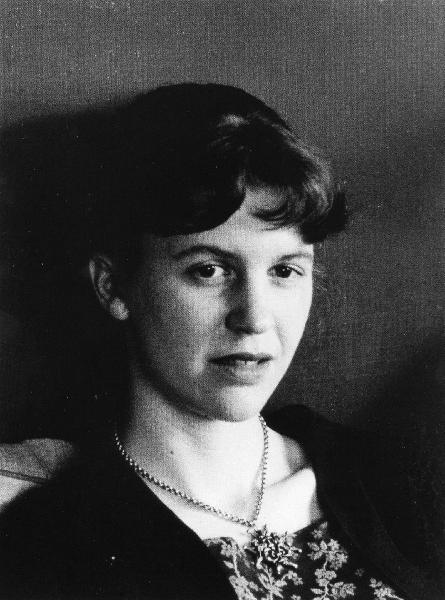Idiosyncratic Poets
Idiosyncratic poets are poets who developed unique styles drawing on tradition but extending it into new realms with a distinctively contemporary flavor. They include: Sylvia Plath, Anne Sexton, John Berryman, Richard Hugo, Philip Levine, James Dickey, Elizabeth Bishop, and Adrienne Rich.
Sylvia Plath (1932-1963)
 Sylvia Plath in her prose and poetry tried to express her personal unresolved psychological problems (the novel The Bell Jar in 1963) as well as the sense of repressive attitudes toward women in the 1950s. Among these were the beliefs - shared by many women themselves - that women should not show anger or ambitiously pursue a career, and instead find fulfillment in tending their husbands and children. Professionally successful women like Plath felt that they lived a contradiction. Sylvia Plath in her prose and poetry tried to express her personal unresolved psychological problems (the novel The Bell Jar in 1963) as well as the sense of repressive attitudes toward women in the 1950s. Among these were the beliefs - shared by many women themselves - that women should not show anger or ambitiously pursue a career, and instead find fulfillment in tending their husbands and children. Professionally successful women like Plath felt that they lived a contradiction.
Plath's life fell to pieces when she and her husband separated and she alone had to take care for the young children in a London apartment during a winter of extreme cold. Ill, isolated, and in despair, Plath worked against the clock to produce a series of stunning poems before she committed suicide by gassing herself in her kitchen. These poems were collected in the volume Ariel (1965), two years after her death. Robert Lowell, who wrote the introduction, noted her poetry's rapid development from the time she and Anne Sexton had attended his poetry classes in 1958.
Plath's early poetry is well crafted and traditional, but her late poems exhibit a desperate bravery and proto-feminist cry of anguish. In "The Applicant" (1966), Plath exposes the emptiness in the current role of wife (who is reduced to an inanimate "it"). In the poem Plath dares to use a nursery rhyme language, a brutal directness. She has a knack for using bold images from popular culture.
A living doll, everywhere you look.
It can sew, it can cook.
It can talk, talk, talk.
It works, there is nothing wrong with it.
You have a hole, it's a poultice.
You have an eye, it's an image.
My boy, it's your last resort.
Will you marry it, marry it, marry it.
Anne Sexton (1928-1974)
Anne Sexton, just like Sylvia Plath, was a passionate woman who attempted to be wife, mother, and poet on the eve of the women's movement in the United States. Like Plath, she suffered from mental illness and ultimately committed suicide.
Sexton's confessional poetry is more autobiographical and emotional than Plath's. Both of them thrust taboo subjects into close focus. Often they daringly introduce female topics such as childbearing, the female body, or marriage seen from a woman's point of view.
The titles of her works indicate her concern with madness and death. They include To Bedlam and Part Way Back (1960), Live or Die (1966), and the posthumous book The Awful Rowing Toward God (1975).
John Berryman (1914-1972)
John Berryman specialized in traditional forms and meters and was inspired by early American history. He wrote self-critical, confessional poems in his Dream Songs (1969) that feature a grotesque autobiographical character named Henry and reflections on his own teaching routine, chronic alcoholism, and ambition. Berryman developed a playful, but profound style enlivened by phrases from folklore, children's rhymes, cliché and slang.
Richard Hugo (1923-1982)
Richard Hugo grew up poor in bleak urban environments which are often the theme of his poems. Hugo wrote nostalgic, confessional poems in bold iambics about shabby, forgotten small towns in his part of the United States. He wrote of shame, failure, and rare moments of acceptance through human relationships. He focused the reader's attention on minute, seemingly inconsequential details in order to make more significant points.
Philip Levine (1928- )
Philip Levine, born in Detroit, Michigan, deals directly with the economic sufferings of workers through keen observation, rage, and painful irony. Like Hugo, his background is urban and poor. He has been the voice for the lonely individual caught up in industrial America. Much of his poetry is somber and reflects an anarchic tendency amid the realization that systems of government will endure.
James Dickey (1923-1997)
James Dickey, as a novelist and poet, was often concerned with strenuous effort, "outdoing, desperately / Outdoing what is required." He yearned for revitalizing contact with the world - a contact he sought in nature (animals, the wild), sexuality, and physical exertion. Dickey's novel Deliverance (1970), set in a southern wilderness river canyon, explores the struggle for survival and the dark side of male bonding. When filmed with the poet himself playing a southern sheriff, the novel and film increased his renown. Dickey's reputation rests largely on his early collection Poems 1957-1967 (1967).
Elizabeth Bishop (1911-1979) and Adrienne Rich (1929- )
Elizabeth Bishop's crystalline intelligence and interest in remote landscapes and metaphors of travel appeal to readers for their exactitude and subtlety. She wrote highly crafted poems in a descriptive style that contains hidden philosophical depths. Bishop may be placed in a "cool" female poetic tradition harking back to Emily Dickinson, in comparison with the "hot" poems of Plath, Sexton, and Adrienne Rich. Though Rich began by writing poems in traditional form and meter, her works, particularly those written after she became an ardent feminist in the 1980s, embody strong emotions. Rich's poem "The Roofwalker" (1961), dedicated to poet Denise Levertov, imagines poetry writing, for women, as a dangerous craft. Like men building a roof, she feels "exposed, larger than life, / and due to break my neck."
|

